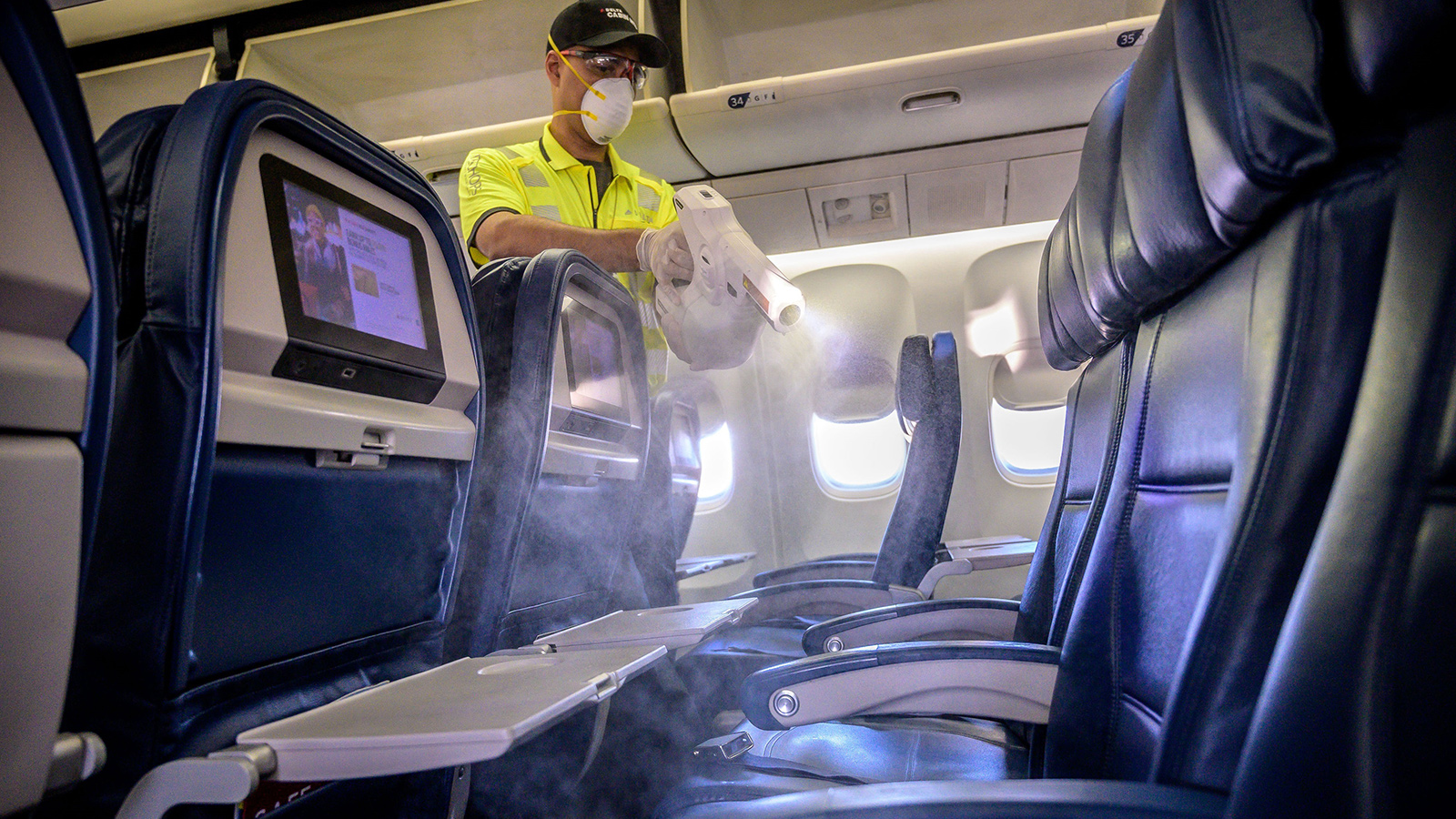Stay Up to Date
Submit your email address to receive the latest industry and Aerospace America news.
Tactics recognize difficulty of social distancing on aircraft
The coronavirus pandemic has tested the air transport industry like no event in history, but one Boeing executive believes that aerospace professionals already have the tools needed to overcome the challenge.
“I think about how we assess airplanes from a threat point of view, whether that threat is lightning strike or windshear,” Boeing’s Mike Delaney told me during a Thursday interview at the AIAA Aviation forum, held via video conference. “For me, it’s natural to think of the covid-19 virus as a threat to that too, to the passengers and crew in the airplane. And so how we would solve that in the aerospace industry is we would design around the requirement to minimize that risk.”
Boeing set out to accomplish this in May by appointing Delaney to lead its new Confident Travel Initiative, in which the company collaborates with airlines, regulators and infectious disease experts to execute a “three-layer approach” to increase passenger and employee comfort with air travel. The requirements: keeping the virus out of the air travel experience, keeping aircraft virus-free and maintaining a healthy cabin environment.
Over the past month, Delaney’s team has focused on actions that can be implemented within 90 days, including compiling a list of EPA-approved disinfectants for air carriers and jumpstarting research into new sanitation techniques such as bathing surfaces in ultraviolet C light, whose sub-280-nanometer wavelengths are more energetic and therefore particularly lethal to viruses, possibly including the novel coronavirus.
“In an airplane, we want to lower the replication rate of the disease to below what you would experience in your everyday life,” Delaney said, though he acknowledges that guidelines like social distancing “won’t work on an airplane,” and that means “it will have to be some other design solution, maybe masks, sanitizers, something else that we’ll put into the model to say, ‘this is equivalently safe or safer than what you would experience in your day-to-day life.’”
Keeping the aircraft virus-free is where Delaney sees Boeing having the greatest impact. By creating a cleaning program that mirrors the existing approach to aircraft maintenance, manufacturers like Boeing can lay out specific procedures and how often airlines should complete those tasks.
“What we’re trying to do in the airplane cleaning program is provide the commodities, say seatbelts, tray tables, flight deck, lavatories, galleys, and then a menu of ways of cleaning it,” he said.
The first step was spreading awareness about existing cleaners like isopropyl alcohol that are proven to kill viruses while not corroding the plastic and metal surfaces in aircraft. Boeing is also among the aircraft manufacturers touting the efficiency of the HEPA (high efficiency particulate air) filters that were already on the aircraft before the pandemic. They are located in the air ducts either underneath or over the cabin, depending on the aircraft. As air entering the engines passes compressor blades, some of it is diverted into ducts and dispersed through the cabin via vents above passengers’ seats. Air is then sucked back into the ducts via floor grilles, where it passes through the HEPA filters, made of a fine mesh designed to trap 99.9% of air particles, before reentering the cabin.
Pairing these existing features with more rigorous cleaning is a good first step, Delaney said, but as travel demand increases, airlines will need new techniques that are less time consuming than conventional cleansing. To that end, Boeing is researching and developing tools including a hand wand that sanitizes via UV light for hard-to-reach areas, plus new anti-microbial coatings that are proven to be effective at preventing the novel coronavirus, specifically, from surviving on surfaces. Getting all these ready could take 2 to 3 years.
Delaney expects them to be wrapped into existing processes as permanent features of healthy flying.
“My personal belief is if you believe we’re 102 years from the last pandemic, I don’t think it’s going to be 102 years to the next one,” he said. “So as an industry, we should learn the lessons from this one.”
About cat hofacker
Cat helps guide our coverage and keeps production of the print magazine on schedule. She became associate editor in 2021 after two years as our staff reporter. Cat joined us in 2019 after covering the 2018 congressional midterm elections as an intern for USA Today.
Related Posts
Stay Up to Date
Submit your email address to receive the latest industry and Aerospace America news.




